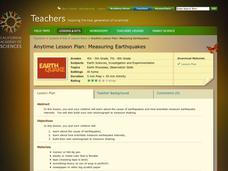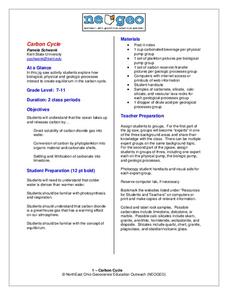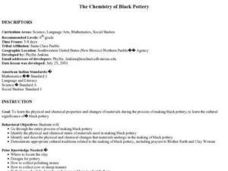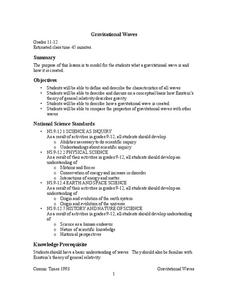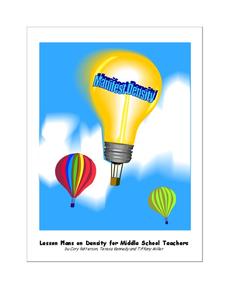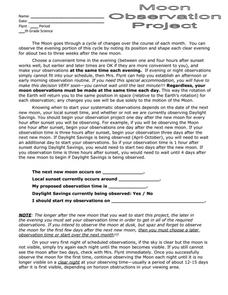California Academy of Science
Measuring Earthquakes
After a brief discussion on earthquakes, make a makeshift seismograph to record the shaking of the table that it sits upon. While the background information will be useful to you as a teacher, the seismograph does not seem like it would...
Curated OER
Water Magic
Learners conduct experiments with ice, water and steam to observe the water cycle. They discuss substances that water accumulates from the Earth as it moves through its cycle.
Curated OER
Science: Discovering Sharks
Students incorporate some basic information regarding ocean life and ecological conservation into their "earth watch" lives.
Curated OER
The Grand Canyon
Fourth graders study the Grand Canyon. They research the Grand Canyon and locate the Colorado River on the map of Arizona. They discuss erosion and read how sedimentary rock was formed. They view photographs of the Grand Canyon and...
NorthEast Ohio Geoscience Education Outreach
Carbon Cycle
Using a jigsaw approach, earth science experts teach each other about the physical, biological, and geologic components of the carbon cycle, with a specific focus on the ocean.
Curated OER
Forbidden City, by William Bell: Lesson
Students visit the 2Learn net site http://www.2Learn.ca and locate under 'NetSteps the Grades 10-12 Forbidden City activity by Bernie Desrosiers.
Curated OER
The Chemistry of Black Pottery
Sixth graders create pottery out of black clay using traditional methods. They demonstrate appropriate Native American cultural traditions related to the making of black pottery, including prayers to Mother Earth and Clay Woman.
Curated OER
Our Planet Earth
Learners brainstorm and discuss cultural relevance of the moon to the Native American community. They utilize the internet to research items about the moon, use a digital camera to take pictures, and then write a report over what they...
NASA
Gravitational Waves
Young scientists participate in a hands-on experiment to explore Einstein's theory of relativity in a creative manner. They investigate various waves and compare their characteristics as they discuss how each wave is created....
University of Southern Indiana
Manifest Density
There's a lot content packed into the four lessons of this physical science unit on density. From salad dressing to the water cycle and hot air balloons, these lessons engage students in hands-on activities that explore real-world...
NASA
Melting Ice: Designing an Experiment
Sometimes, despite the best laid plans, the unexpected will occur. Learners witness this firsthand as they carefully design an experiment to determine the time needed for ice to melt in salt water or pure water. They uncover facts not...
Earth Day Network
Filtering Water
See the water filtration system up close with a fun science experiment. Young scientists work for several class periods to design a water filter using household objects, and then decide which filter material would be most effective...
University of Colorado
Modeling Sizes of Planets
The density of the huge planet of Saturn is 0.7 g/cm3, which means it could float in water! In the second part of 22, science pupils explore the size and order of the planets. They then calculate weight and/or gravity and density of...
University of Colorado
Looking Inside Planets
All of the gas giant's atmospheres consist of hydrogen and helium, the same gases that make up all stars. The third in a series of 22, the activity challenges pupils to make scale models of the interiors of planets in order to...
NASA
What’s the Problem with Isotropy?
Some patterns are so small, we can't see them without the help of technology. The same is true for cosmic microwave background radiation. During this activity and discussion, scholars examine both anisotropic and isotropic items and...
Newspaper Association of America
Cereal Bowl Science and Other Investigations with the Newspaper
What do cereal, fog, and space shuttles have to do with newspapers? A collection of science investigations encourage critical thinking using connections to the various parts of the newspaper. Activities range from building origami seed...
Chicago Botanic Garden
Climate and Forest Ecosystem Services
Forests, through sequestration, capture excess carbon dioxide in our atmosphere and store it, aiding in climate change. The third installment in a four-part series on how climate impacts forests explores carbon sequestration....
University of Colorado
Phases of Charon
Pluto, although no longer considered a planet, has five moons. Pluto's moon, Charon, is the focus of a resource that describes how the moon is viewed from the surface of Pluto. Photos help individuals see how Charon would look at...
Rhythm Rhyme Results
Whatʼs the Same and Whatʼs Different?
Learn about radiation, convection, and conduction with a multiple choice worksheet. Each question prompts kids to decide what is different about each form of heat energy transfer, and what is the same.
Chicago Botanic Garden
Climate Change Impacts on Ecosystem Services
The fourth activity in a series of five has classes participate in a jigsaw to learn about global impacts of climate change and then share their new information with a home group. Groups then research impacts of climate change (droughts,...
School World
Moon Observation Project
Mrs. Flynt has designed a 12-day moon observation activity that is best assigned when daylight hours are shorter. Middle school moon experts record several factors, including the altitude above the horizon, the azimuth, the phase, and...
Wild BC
Is Climate Change Good for Us?
Is it really that big of a deal if the global climate undergoes a little change? Young environmentalists consider this very question as they discuss in small groups the impact of different climate change scenarios on their lives,...
Chicago Botanic Garden
Introducing Ecosystem Services
Ecosystems provide many things humans not only use but also need in order to survive. The last lesson in the series of seven introduces scholars to the idea of ecosystem services, that ecosystems provide humans with many things we need....
Columbus City Schools
Keeping It Hot!
Hot off the presses, this collection of thermal energy activities, lessons, and printables is sure to amaze. Demonstrate how thermal energy moves about in a system using simple materials. Pupils demonstrate their understanding...
